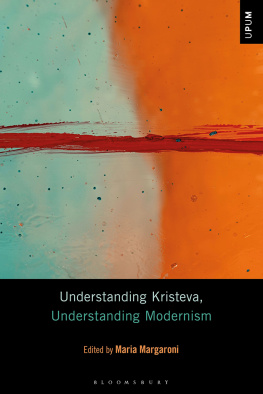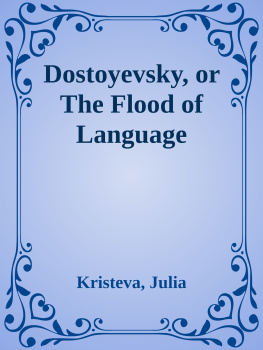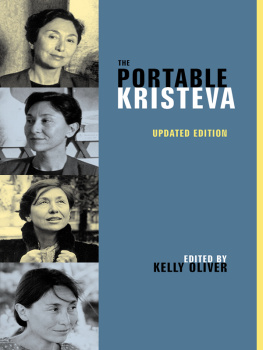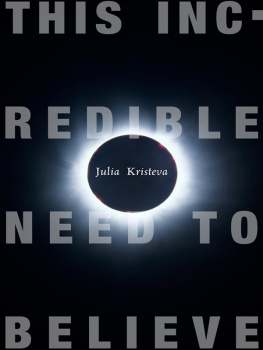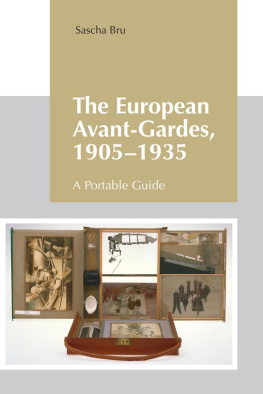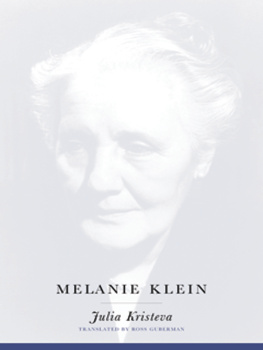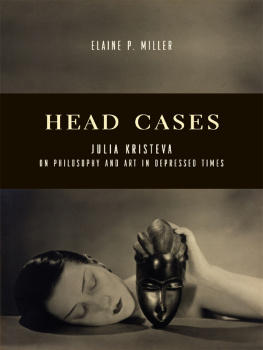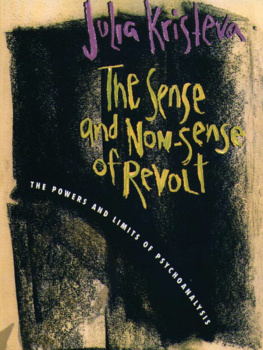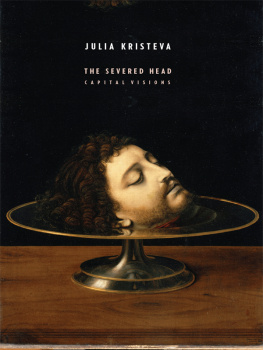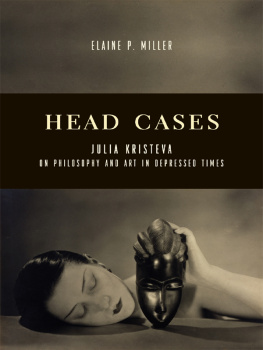Understanding Kristeva, Understanding Modernism
The aim of each volume in Understanding Philosophy, Understanding Modernism is to understand a philosophical thinker more fully through literary and cultural modernism and consequently to understand literary modernism better through a key philosophical figure. In this way, the series also rethinks the limits of modernism, calling attention to lacunae in modernist studies and sometimes in the philosophical work under examination.
Series Editors:
Paul Ardoin, S. E. Gontarski, and Laci Mattison
Volumes in the Series:
Understanding Bergson, Understanding Modernism
Edited by Paul Ardoin, S. E. Gontarski, and Laci Mattison
Understanding Deleuze, Understanding Modernism
Edited by S. E. Gontarski, Paul Ardoin and Laci Mattison
Understanding Wittgenstein, Understanding Modernism
Edited by Anat Matar
Understanding Foucault, Understanding Modernism
Edited by David Scott
Understanding James, Understanding Modernism
Edited by David H. Evans
Understanding Rancire, Understanding Modernism
Edited by Patrick M. Bray
Understanding Blanchot, Understanding Modernism
Edited by Christopher Langlois
Understanding Merleau-Ponty, Understanding Modernism
Edited by Ariane Mildenberg
Understanding Nietzsche, Understanding Modernism
Edited by Douglas Burnham and Brian Pines
Understanding Derrida, Understanding Modernism
Edited by Jean-Michel Rabat
Understanding Adorno, Understanding Modernism
Edited by Robin Truth Goodman
Understanding Flusser, Understanding Modernism
Edited by Aaron Jaffe, Rodrigo Martini, and Michael F. Miller
Understanding Marx, Understanding Modernism
Edited by Mark Steven
Understanding Barthes, Understanding Modernism
Edited by Jeffrey R. Di Leo and Zahi Zalloua
Understanding Kristeva, Understanding Modernism
Edited by Maria Margaroni
Understanding Bakhtin, Understanding Modernism (forthcoming)
Edited by Philippe Birgy
Understanding Badiou, Understanding Modernism (forthcoming)
Edited by Arka Chattopadhyay and Arthur Rose
Understanding iek, Understanding Modernism (forthcoming)
Edited by Jeffrey R. Di Leo and Zahi Zalloua
Understanding Nancy, Understanding Modernism (forthcoming)
Edited by Cosmin Toma
Understanding Cavell, Understanding Modernism (forthcoming)
Edited by Paola Marrati
Understanding Kristeva, Understanding Modernism
Edited by
Maria Margaroni

CONTENTS
Rina Arya is a Professor at the University of Huddersfield. She is interested in the visual and material culture of religion. Author of Francis Bacon: Painting in a Godless World (2012) and Abjection and Representation (2014), she is currently working on a study of cultural appropriation in a Hindu context.
Carol Mastrangelo Bov is Teaching Professor in English/Gender, Sexuality, and Womens Studies at the University of Pittsburgh and Professor Emerita in French at Westminster College, Pennsylvania. She is the author of two books on Kristeva, Language and Politics in Julia Kristeva: Literature, Art, Therapy (SUNY Press, 2006) and Kristeva in America: Re-imagining the Exceptional (Palgrave Macmillan, 2020). Her other publications include many articles on twentieth- and twenty-first-century literature, film and literary translation. She has translated Hlne Cixous, Luce Irigaray and Julia Kristeva. A book on Colette as well as a new translation of her La Maison de Claudine is in the works.
Tina Chanter has published on contemporary French philosophy, drawing inspiration from a range of sources, including feminist theory, race theory, psychoanalysis, art, politics, film and tragedy. Her most recent books are Whose Antigone? The Tragic Marginalisation of Slavery and Art; Politics and Rancire: Broken Perceptions. She taught in the United States, most recently in Chicago, before returning to the UK, where she worked and taught in Bristol and London before joining Newcastle University.
Nicholas Chare is Professor of Art History in the Department of History of Art and Film Studies at the Universit de Montral. He is the author of After FrancisBacon (2012) and the co-editor (with Valrie Bienvenue) of Animals, Plants and Afterimages (2022) and (with Ersy Contogouris) On the Nude (2022). His work has appeared in journals including Angelaki, Art History, Cultural Critique, Paragraph, parallax and symplok.
Marios Constantinou received his PhD from the New School for Social Research. He is the editor of Badiou and the Political Condition (EUP), as well as of special issues on Space and Event (Environment and Planning D: Society and Space) and Imperial Affect (Parallax). His writings and essays appeared in Third Text, Parrhesia, The Years Work in Critical and Cultural Theory, Angelaki, Parallax, Thesis Eleven, Postcolonial Studies and elsewhere. They all attempt from different angles to retrieve the counter-imperial truth of the political from the grip of contemporary norms of biopower.
Elisabetta Convento (MA University of Padova, MA Purdue University, PhD University of Trento and Paris 8) is Director of Boston University Padova programme and Professor of Italian Studies. For Boston University she recently taught Contemporary Italian Literature and The Intersection of Gender, Race, Media and Covid 19. She has published in the fields of linguistics, women studies and Italian studies. Among other works, she is the translator and editor of Julia Kristevas Il rischio del pensare (Il Melangolo, 2006) and editor of a Twentieth-Century Literary Criticism volume devoted to Dino Buzzati (Gale, 2021).
Robin Truth Goodman is Professor of English at Florida State University. Her published works include: Gender Commodity: Marketing Feminist Identities and the Promise of Security; Understanding Adorno, Understanding Modernism; The Bloomsbury Handbook of 21st Century Feminist Theory; Promissory Notes: On the Literary Conditions of Debt; Gender for the Warfare State: Literature of Women in Combat; Literature and the Development of Feminist Theory; Gender Work: Feminism After Neoliberalism; Feminist Theory in Pursuit of the Public: Women and the Re-Privatization of Labor; Policing Narratives and the State of Terror; World, Class, Women: Global Literature, Education, and Feminism; Strange Love, or How We Learn to Stop Worrying and Love the Market; and Infertilities: Exploring Fictions of Barren Bodies. She has recently edited Feminism as World Literature (forthcoming from Bloomsbury, 2023).
Christos Hadjiyiannis is a research fellow at the Centre for Medieval Arts and Rituals at the University of Cyprus. He has published widely on twentieth-century literature and art, and is the author of Conservative Modernists: Literature and Tory Politics in Britain, 19001920 (Cambridge University Press, 2018). He is also the editor, with Rachel Potter, of The Cambridge Companion to Twentieth-Century Literature and Politics (2020).
Esther Hutfless is a philosopher and psychoanalyst in Vienna, Austria. Her main teaching and research areas include: deconstruction, psychoanalysis, feminist philosophy, criture fminine and queer theory. Her recent publications include essays on the case of Dora, a Freuderridian approach to a non-normative psychoanalysis and on Jean Laplanche and Queer Theory. She has co-edited a book on queer theory and psychoanalysis with Barbara Zach, and the German translations of Hlne Cixous
Next page
